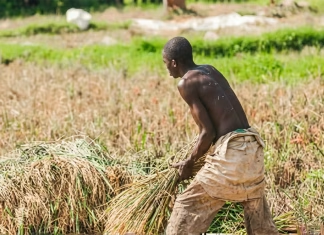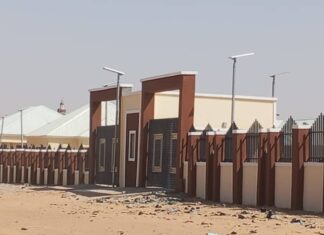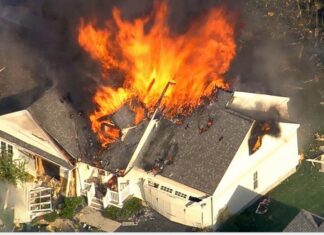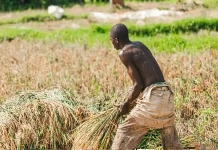In Kankarelu village of Ringim LGA of Jigawa, a young girl of 17, Hansa’u was into her 20th day in the house of Alasan Audu — a 30 year old man she was married to despite being in love with another person – but she has in as many nights resisted all his sexual advances.
That night, in late April, he decided to force himself on her and that ultimately led to her death. Newspapers were awash with the story of the man who raped his wife to death, many have seen it being termed as rape as wrong, instead of looking ways to address the injustice and its prevalence in northern Nigeria. There are many Hansa’us living in domestic bondage in their matrimonial homes, and most of the cases go unreported because the husbands are always right — and because they haven’t led to death.
Rape is a form of sexual intercourse carried out forcibly, without consent or with a person that is not old enough to give consent or not in the right mental state to give consent such as imbeciles or an intoxicated person, while marital rape is rape committed by the person to whom the victim is married to. Marital rape can cause serious health repercussions including, unwanted pregnancies, depression, and Sexually Transmitted Infections.
The idea of rape occurring in the matrimonial home has become a subject of controversy in this part of the world. Those with very traditional beliefs see a woman as part of her husband’s property, to do with her as he pleases. Some see a woman’s consent to marriage as consent to sexual intercourse anytime and any day the husband desires. Another argument is that no law recognizes it as a crime in Nigeria – the Penal Code expressly excludes it as a form of rape under S. 282 (2) – and thus, the usage of the term is even wrong and finally, some argue that it is unrecognized under Islamic law.
The Violence Against Persons (Prohibition) Act (VAPP) 2015 addressed many forms of domestic violence – that were hitherto culture—backed male entitlement – like spousal battery, forceful ejection from home, forced financial dependence or economic abuse, harmful widowhood practices, harmful traditional practice and eliminated what was a gender biased nature of rape and expanded its scope.
Men and women could all be raped by anyone (spouse and not) including through the anus or mouth and with whatever object. This development means, the man reported to have been raped to death by his wives on 17th July, 2012 and was termed as manslaughter in 2012 would be recognized as rape today, and so would have been the case of Hansa’u and many women going through similar cases in the north but the crime is contained in an Act of the National Assembly that falls in the concurrent list; meaning it is only applicable in Abuja and the states that have adopted and enacted a similar law. So far only Kaduna State has adopted the VAPP in the north.
I do understand that as a largely Muslim society, the practicability of any law is dependent upon its conferment with Islamic values. Which is why we should look at the development of the Penal Code, which contains the bulk of substantive laws in northern Nigeria.
The Penal Code was enacted in 1959 based on the 1899 Penal Code of Sudan which was based on the Charter Act passed by the British Parliament in 1833 for the Colony of India and its inhabitants. It was therefore thought necessary by S. S Richardson to model our criminal justice system on a code in “a country in many ways similar to Northern Nigeria.”
A committee made up of Justice Abu—Rannat, Mr Peter Achimugu, Mal Shettima Kashim, M. Musa Othman and Prof. Anderson was set up and began work in early 1958. They had the following options:
1. Adopt a 100% Western system of law;
2. Adopt a 100% system of Islamic Law; or
3. Adopt a hybrid of the two.
A hybrid of the two was adopted, which Sir Ahmadu Bello explained was “to assure northern minorities and to allay the apprehensions which they felt in the past” and as a matter of prestige and to meet development standards of the 20th century. Therefore, offences known to Islamic Law were included in the Code, even though the punishments vary.
The Position of Islam on Marital Rape
Islam touches every aspect of people’s lives, including the matter at hand. The menace bedeviling our society can never be defeated until we collectively strive to know what is allowed and what is prohibited. The kind of marital life permitted by Islam is that of muasyarah bil ma’ruf in verse 19 of Surat An—Nisa which leaves no room for marital rape or any form of domestic violence to occur.
It describes a friendly relationship between husband and wife with the husband bounded with an obligation to treat her well and to live a life of peace and happiness. Giving due consideration to the need and willingness of the wife in sexual matter is part of this obligation, while harming her is a breach of the obligation.
The protection of women from harm is a fundamental right that has only been provided by a single religion – Islam. Allah (SWT) in Surah Al—baqarah 2:222 said “And they ask you about menstruation. Say, “It is harm, so keep away from wives during menstruation. And do not approach them until they are pure. And when they have purified themselves, then come to them from where Allah has ordained for you. Indeed, Allah loves those who are constantly repentant and loves those who purify themselves.” This provision is the first of many that Islam took to safeguard women from marital rape and domestic abuse.
The Prophet describes one’s spouse as a ‘garment’ and commanded men to deal with their wives honorably; the romance, the sanctuary, the protection, and the warmth; not rape, bitter cold treatment and other forms of domestic violence; be it physical, verbal, psychological, economic or sexual. Now, what do you call the act perpetrated by Audu against his garment? Rape or not, an evil act with any other name would still have the same dastard effect!
Wisdom must be applied in the interpretation of the Quran if we are to defeat gross misinterpretation that robs women of their dignity and spouses, the chance to live a fruitful and harmonious marital life as commanded by Allah. One of the most misinterpreted verses of the Holy Qur’an is Q2V223 which says that “Your wives are as fields for you, so enter your place of cultivation however you wish.” Most people assume that it permits the husband to have sexual intercourse with his wife however, wherever and whenever he wants. This is wrong!
Dr Isa Ali Pantami in his 2020 Ramadan Tafseer Day 10 explained that the metaphor used in the Ayat is a reference to sexual positions. When the people of Mecca migrated to Medina, most of them took wives in the city but an issue arose. The migrants had knowledge of many different styles while the people of Medina believed only one style can be used and that caused confusion. They met the prophet and he instructed that when approaching their wives any style could be used as long as it is not anal. The metaphor also showed marriage as an institution where “you reap what you sow” as the reward in the hereafter depends on the way you treat wives, how you raise your children, and why spouses should look beyond sexual desires and instead do a lot of good things to each other.
Another position against marital rape is the prophet’s command to husbands not to start a sexual intercourse by “falling onto women like animals.” i.e without flirting, talking and kissing till she gets in the mood as reported by Ibn Majah. Also Anas ibn Malik reported that the Prophet said “Three things fall under unkindness and one of them is when the man engages in sexual act with his wife without sending a messenger; humor and kisses. No one should directly fall on his wife like one buffalo does to another”
Many Muslims with the belief that forced sexual intercourse with wives is religiously allowed rely on a Hadith from Abu Hurayrah, who heard the Prophet say “When a husband calls his wife to bed, and she refuses and [as a result] the husband spends the night in anger, then angels curse the wife all night till dawn.” This is the most misunderstood and misapplied Hadith, as apart from menstruation that was expressly mentioned in the Holy Qur’an, there are exceptions like when the wife is unwell, tired, or simply not in the mood, while some jurists add that when the husband is intoxicated or has a sexually transmitted infections then the wife could reject his advances without the angels cursing her.
The Hadith also highlighted the free will of the wife, with no express or implied authorization for the husband to lay a finger on her, or to forcefully take that which he beliefs is his to take by right but only warns the woman of the implications if her action is unjustified. It is unjustified if the woman’s action is for manipulative purposes, and even that doesn’t empower a man to engage in nonconsensual sex with his wife but to follow the right channels.
The right channel as specified in the Holy Quran in Surah An—Nisa [4:35] where Allah (SWT) commanded “And if you fear dissension between the two, send an arbitrator from his people and an arbitrator from her people. If they both desire reconciliation, Allah will cause it between them. Indeed, Allah is ever Knowing and Acquainted [with all things].”
Punishment for Marital Rape
Punishments under Islamic Law can best be understood by looking at its three major types of punishments — hadd, qisas and ta’zir.
Hadd are crimes against the rights of God, and their punishment are fixed in the Quran and hadith. The State has been saddled with the responsibility of punishing them. Hadd offences are:
* Theft (sariqa) — amputation of the hand
* Highway robbery (qat’ al—tariq) — death
* Illegal sexual intercourse (zina’) — death by stoning or one hundred lashes
* False accusation of zina’ (qadhf) — eighty lashes
* Drinking alcohol (sharb al—khamr) — eighty lashes
* While the jurists are divided on apostasy (ridda)
Qisas is an Islamic Term for retributive justice in the case of an intentional crime, it is of two kinds — qisas for life, and qisas for body parts. It is available to the victim or his heirs against a perpetrator found guilty of murder or intentional bodily harm.
Ta’zir is punishment for offences at the discretion of the judge. Ta’zir could be applied to offences for which no punishment is specified in the Qur’an or to hadd offences that have not met the standards of proof.
The concept of ‘marital rape’ is not a hudood offence, but this does not mean that it is not acceptable in Islam or would go unpunished. The discretion to punish for it is at the hands of the judges, and it can be through imprisonment or lashing.
Many scholars are also of the view that a wife has the right to seek civil redress (jirah) for her injuries under Sharia law if she is assaulted by her spouse, and i alligne with this view too.
What next?
Protecting the exemption of marital rape at the cost of human dignity is wrong and inhumane. We have a duty to protect everyone and why should the wife be treated differently? If the law can protect children from their parents, followers from their leaders, and if the religion we so often like to use as an excuse to perpetrate evil against women is against it — then husbands must no longer be allowed to rape their wives without the fear of legal consequences
Many believe that the criminalization of marital rape would destabilize the family institution, as if a woman sells away her body to her husband when she collects her dowry, and that marriage as an institution is built solely on sexual foundations.
We have criminalized physical violence in the domestic sphere then why not sexual? Nigeria remains among just 36 countries in the world that have continued to think that matrimonial consent cannot be retracted until after a divorce. Then, what gives?
Gimba is the author of Semiprecious Elysian Fields. He is a Child Rights Practitioner with strong interest in societal reforms.

He can be reached by email at barrgimba@nigerianbar.ng
Follow the Neptune Prime channel on WhatsApp:
Do you have breaking news, interview request, opinion, suggestion, or want your event covered? Email us at neptuneprime2233@gmail.com














